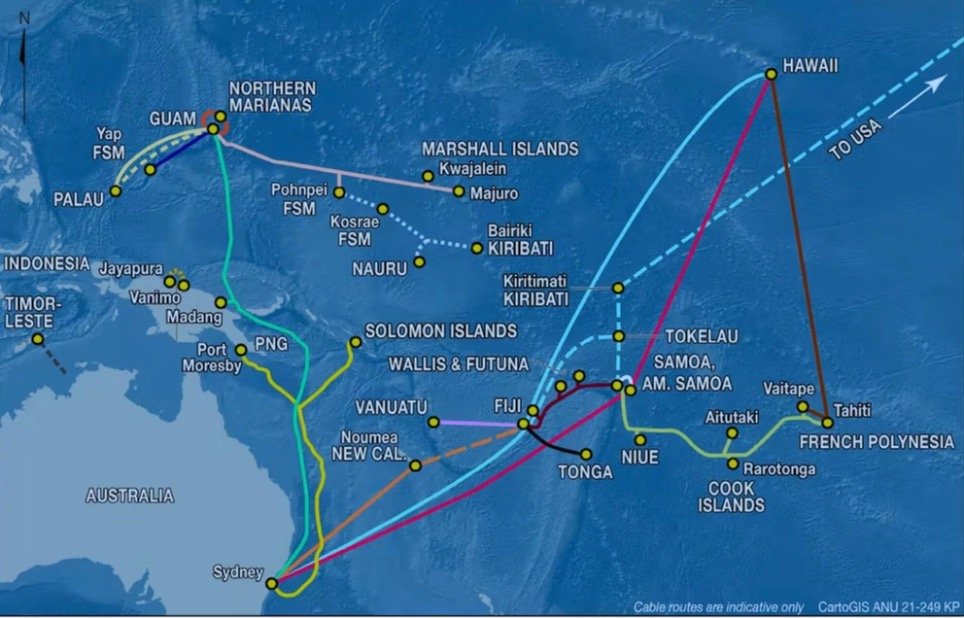How Digital Transformation Could Catalyze a New Era of Economic Prosperity in the Pacific
May 2023
The Pacific region has long been known for its diverse cultures and stunning tropical landscapes, but has for the most part not enjoyed the same level of economic prosperity as other regions, with Australia and New Zealand being notable outliers. There is a massive amount of untapped potential in this island-rich region, which could be unlocked through digital transformation.
The Digital Revolution is Continuously Growing
We live in an age of innovation, where digital technology is providing solutions to problems before we’ve even realised we needed them. We see it every day as we find new ways to travel, eat and shop.
-David Lidington
Digital transformation refers to the process of leveraging new technologies that can improve and transform business operations. This encompasses everything from automating processes to implementing new customer engagement strategies.
We cannot overstate the importance of going digital for businesses, as it has become increasingly essential for companies to remain competitive in today's digital landscape and global economy.
Digital transformation is one of the most significant and transformative developments of the 21st century. It has revolutionized the way businesses operate on a fundamental level, and has facilitated economic growth and development in various parts of the world. In the Pacific region, digital transformation has been slow-going, but is showing signs of gaining traction, and has the potential to catalyze a new era of economic prosperity.
Digital Transformation in the Pacific
With a population of 11 million and an internet penetration average of around half the population, the untapped potential of the Pacific islands making a deeper commitment to going digital is significant. The World Bank determined that by adopting a digital transformation strategy, the region could see an increase in $5B USD added to its collective GDP.
What's more is that the potential revenue governments throughout the region could see amounts to over $1B USD. Plenty of jobs are also waiting. In fact, there would be a boon of nearly 300,000 jobs within the Pacific region's ICT sector alone by 2040.
The benefits of digital transformation are legion, and when it comes to the Pacific region specifically, it could help with increasing access to:
Markets
Information
Online Education
Friends and Family
Government Services
Telehealth and Telemedicine
Financial Services
Banking Services
This is just scratching the surface in how Pacific digital transformation could help the region. With the digital gender gap closing and more people getting online (largely thanks to smartphones), the time is ripe for the public and private sectors in the Pacific to work together and leverage the tremendous benefits going digital has for their economies and people.
How Individuals in the Pacific Can Leverage Digital Transformation
With the entire world going digital, it is vital for everyday people in the Pacific to know how they can benefit from this ever-accelerating trend and get to enjoy greater economic prosperity, financial freedom, and an improved quality of life.
Also, it is important to understand that digital tools and technologies are ever-changing. What worked before will not necessarily work now; requiring businesses and governments to remain agile and ready to update their digital strategy quickly. Not doing so will lead to a failed digital transformation strategy.
The next 5 years will be more disruptive than the last 15. This is NOT business as usual. A lot of technology that came in three years ago doesn’t work anymore.
-Saul Berman, IBM
There are numerous ways individuals living on remote islands dotting the Pacific Ocean stand to gain from using digital tools. Here are some noteworthy ones:
Digital Skills – Take advantage of free online courses, workshops, and tutorials, thereby becoming more competitive in the job market and increasing income.
Social Media – Popular social media platforms like Instagram, Facebook, and Pinterest can be used to promote local businesses, products, and services to a wider audience.
Online Marketplaces – Products and services can be sold on local (and international if shipping fees are reasonable) online marketplaces to expand their potential customer base.
Freelancing – Skills and services can be offered to potential clients and customers on freelance platforms like Upwork, Fiverr, and Guru, thereby helping people generate income from even the most remote island if they have an internet connection.
Remote Work – Benefit from remote work opportunities companies and organizations are offering in the region, allowing people to work from their homes or anywhere else as long as they have internet access.
Online Education – There are many online education platforms like Udemy, Skillshare, and Kajabi, as well as free ones including Khan Academy, edX, and Alison, that can help people advance in their careers and increase their earning potential.
Online Banking – Digitized and remote banking services allow people to manage their finances more efficiently, including paying bills, transferring money, and saving for the future.
Telemedicine – Access online medical services such as medical advice and remote treatment for certain health issues, which can help save both time and money.
These are just some of the digital opportunities that people living on remote islands in the Pacific region can benefit from. The essential key to leveraging these benefits is to get more satellite, fiber optic, and mobile connectivity to people who lack it.
International undersea internet cables for Pacific Island countries.
Potential Pacific Digital Transformation Benefits
In a world where more than half the population is under 25 years old, businesses cannot afford to ignore digital transformation.
-McKinsey Global Institute
The uniqueness of the Pacific region brings with it both challenges and opportunities when it comes to digitization. Its geographic dispersion, limited resources, and vulnerability to natural disasters have hampered its local economies for a long time. However, the internet has opened the door wide open for an economic ascent the likes of which was never possible in the Pacific before.
Digital transformation has the potential to generate significant economic benefits for Pacific island nations. Some of the most impactful ones are:
Increased Productivity and Efficiency
Productivity and efficiency soar when digital technologies are adopted by businesses. Whether a company is involved in agriculture, manufacturing, services, or something else, adopting digital tools and processes categorically results in streamlined operations, reduced costs, and higher-quality goods and services.
Improved Access to Markets
Digital technologies make it easy to connect with local and global markets, which enables businesses to significantly and quickly expand their market reach and customer base while tapping into new opportunities.
New Job Opportunities
With the average annual per capita income in the Pacific region under $7,000 USD, there is a major opportunity for digital transformation to provide new and prosperous avenues for generating income. Thanks to high-speed internet and the wide array of digital tools available, remote work is easier than ever. Those living in rural areas or remote islands stand to significantly increase their economic standing in ways that previously would not have been possible.
Greater Resilience
Digital technologies can increase the resilience of both businesses and communities through improving disaster response, facilitating access to information, and enabling remote communication and collaboration.
Other Benefits
The Pacific digital transformation benefits don't stop there. Here's a list of even more ways going digital can lead to greater economic resilience in the Pacific region:
Improved customer experience
Increased innovation
Greater agility
Enhanced data-driven decision-making
Improved supply chain management
Improved collaboration
Enhanced competitiveness
Challenges to Pacific Digital Transformation Adoption
When digital transformation is done right, it’s like a caterpillar turning into a butterfly, but when done wrong, all you have is a really fast caterpillar.
-George Westerman, MIT
Although these benefits can improve the economies and quality of life of Pacific nations and their people, there are challenges to digital transformation being adopted in this region.
Here are challenges we here at Pacific Advisory have identified, as well as proposed solutions:
Limited Infrastructure and Connectivity
With internet connectivity ranging from 12% in the Solomon Islands to an average of around 50% across the Pacific region, there is a lack of connectivity, along with related infrastructure. Even though New Caledonia appears to have a high level of internet connectivity that's above 80%, its broadband connectivity is just 20%, with this rate getting down to just 1% in Vanuatu. This means certain digital economy opportunities, such as anything requiring high levels of bandwidth, continue to be inaccessible to most in the Pacific.
Proposal: For digital transformation to provide the full spectrum of its benefits, governments and businesses should work together and invest in improving broadband connectivity (especially fiber optic in large towns and cities), expanding digital infrastructure, and helping people develop digital skills and capabilities.
Lack of Required Skills and Education
In order to effectively leverage the benefits of digital transformation, a skilled and educated workforce is key. The majority of people in Pacific island nations like Vanuatu can be classified as working in the agricultural industry, meaning digital skills and education are not usually integrated into an average workday.
Proposal: What governments and businesses can do is invest in digital education and training programs to build out a pipeline of talent that can support and grow the digital economy.
Limited Regulatory and Legal Frameworks
While countries like Singapore have thoroughly studied and rolled out regulatory and legal frameworks that transformed it into the world's leading technological innovation hub, Pacific island nations have been slow to match the commitment to digital transformation.
There are highly complex legal and regulatory issues that require clarity in order for going digital being done properly. Issues like data privacy, cybersecurity, and intellectual property rights all come into play and must be carefully considered. After all, in 2022 Vanuatu became the first country in the world to get hacked in a way that the entire government's digital infrastructure got taken down for a significant amount of time.
Proposal: Governments should establish clear and comprehensive regulatory frameworks that support and encourage digital innovation while protecting the interests of both consumers and businesses.
Conclusion
Pacific digital transformation has the potential to catalyze a new era of economic prosperity in the region. By embracing digital technologies and overcoming the challenges that hinder their adoption, this region can unlock significant economic benefits, create new job opportunities, and improve the quality of life for its people. Collaboration and partnership between the public and private sectors will be key in achieving successful digital transformation. If going digital becomes a priority, economic prosperity is sure to follow. After all, it has wherever digital transformation was successfully adopted. Link
If you would like to learn more about how digital transformation can help your business, contact us today. We provide advisory and consulting services for both the private and public sector to help leverage digital technologies and unlock greater success.
About the Author
Paul Lenda is a Digital Advisor at Pacific Advisory. He has a decade of experience working and operating within the blockchain industry, and advises on the responsible use of emerging & digital technologies, as well as adoption of regenerative systems, in a way that leverages benefits, reduces risks, and optimizes processes, resulting in improved socio-economic models.



